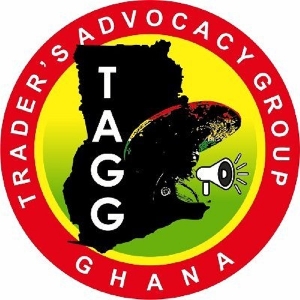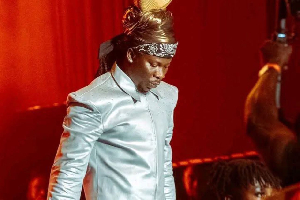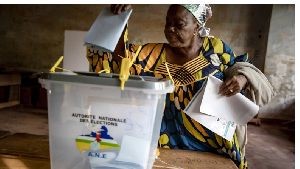The opposition National Democratic Congress’ (NDC) Campaign Spokesperson on Finance, Hon. Isaac Adongo has revealed how the party plans on financing some of its major promises outlined in his party’s manifesto which comes as a contradiction to how his colleagues had earlier stated.
Hon. Adongo speaking at the NDC’s Townhall meeting in Kumasi on Tuesday explained that his party plans on financing the numerous promises including the much-talked-about ‘Big Push’ and ‘Free Primary Health Care’ by re-aligning and reprioritizing Government spending to priority projects to achieve resource allocation efficiency.
He stated that the next NDC government will review the capping and re-alignment arrangements for the current management and utilization of the GETFUND as a re-aligning and refocusing of about just 50% of the existing funding of about Ghc2.2 billion a year of GETFund will result in an additional amount of Ghc4.4 billion from Getfund proceeds alone which will be used to fund educational related infrastructure over the term of the NDC Government from 2021 to 2024. In total, investment in education will top GHc8 billion in four years at an average of Ghc 2 billion a year from Getfund alone.
He summarized that Getfund capping review and re-prioritising will provide the government GHc8 billion for educational infrastructure, National Health Insurance Fund (NHIF) capping review and re-prioritizing will yield government GHC7.6 billion to finance the free primary health care and health infrastructure, Road Fund capping review and re-alignment which will provide GHc2.4 billion will be used to construct roads and other related road infrastructure.
However, the spokesperson on Health for the NDC’s manifesto committee, Sylvester Mensah has said a percentage of revenue accrued from oil transactions will be used to fund the free primary healthcare policy promised by the party. His statement was corroborated by the Minority Spokesperson on Finance in Parliament, Cassie Ato Forson in an interview on JoyFM that the next NDC government will rely on the oil revenue to finance most of its proposed promises including the free primary health care.
Below is the detailed speech as delivered by Hon. Isaac Adongo, MP for Bolgatanga Central and the NDC’s Campaign Spokesperson on Finance on how his party plans on financing it’s outlined promises.
“The NDC has launched an ambitious and far-reaching manifesto for the 2020 elections that seeks to fix the economy, unite against poverty and build an inclusive economy for all with an overarching emphasis on job creation, empowering Ghanaians to take the commanding heights of our economy and ensure social justice and inclusion.
Consistent with expectations regarding such a bold and promising agenda, questions have been asked as to how we intend to finance this programme, particularly the big push.
The big push is a catalytic strategy to invest about $10 billion into carefully crafted growth-enhancing infrastructural renewal and transformational agenda over a five year period that will put Ghanaian youth and businesses to work by awarding these contracts to Ghanaian businesses.
The NDC has a fiscal strategy that will finance the big push and our flagship programmes in a fiscally responsible and sustainable manner.
The following are some of the sources of funding the big push and related programmes through resetting the fiscal framework, re-aligning and reprioritizing Government spending to priority projects to achieve resource allocation efficiency.
• We will review the capping and re-alignment arrangements for the current management and utilization of the GETFUND. Since 2017, Government has capped the proceeds to the Ghana Education Trust Fund by an average of GHC900 million a year. The total over the four years ending December 2020 is estimated at Ghc3.6 billion. Unfortunately, our children continue to attend schools in poor educational facilities with the double-track still in force.
Together, we with re-aligning and refocusing of about just 50% of the existing funding of about Ghc2.2 billion a year of GETFund, an additional Ghc4.4 billion from Getfund proceeds will be available to fund educational related infrastructure over the term of the NDC Government from 2021 to 2024. In total, investment in education will top GHc8 billion in four years at an average of Ghc 2 billion a year from Getfund alone.
• We will review the capping and re-alignment arrangements for the current management and utilization of the NHIF. Since 2017, Government has capped the proceeds to the National Health Insurance Fund by an average of GHC900 million a year. The total over the four years ending December 2020 is estimated at about Ghc3.6. Together with -realigning and refocusing of about just 50% of the existing funding of about Ghc2 billion of NHIF, an additional Ghc4 billion from NHIF proceeds will be available to fund health-related infrastructure over the term of the NDC Government from 2021 to 2024. In total, investment in health delivery will top GHc7.6 billion in four years at an average of Ghc 1.9 billion a year from NHIF alone.
• The capping and re-alliances t of the road fund alone is estimated to have taken about GHc2.4 billion from the road fund in the four years ending December 2020. We intend to review the law Governing the road fund to enable us to allocate that money to support critical road infrastructural development.
• Over the last three years Ghana has consistently raised US$3 billion Eurobonds a year to finance that budget and for liability management. Out of this amount, $ 2 billion has always been earmarked for expenditures in the budget and a further $1 billion to re-finance maturing debt obligations.
Unfortunately, the Government has tended to spend in excess of 70% of our borrowings from Eurobonds to finance consumptions expenditure at the expense of capital or infrastructure. Whilst we will work towards increasing revenue mobilization and FastTrack fiscal consolidation, we intend to allocate a minimum of $ 1.5 billion a year from any deficit financing arrangements to fund the big push. This resetting of fiscal framework alone will contribute about $6 billion in four years to deliver the big push agenda.
• In summary, the following revenue yield from resetting the fiscal framework and re-prioritising budgetary allocations will contribute to funding the big push and other promises in our manifesto;
• Getfund capping review and re-prioritising GHc8 billion.
• NHIF capping review and re-prioritising GHC7.6 billion.
• Road Fund capping review and re-alignment GHc2.4 billion.
• Re-prioritisation of deficit financing GHC36 billion.
• Total big push for four out of five-year plan GHc54 billion.
• The estimates regarding the estimated proceeds from Getfund levies and NHIL are very conservative and assume that these revenues will remain constant without growth in the planned period contrary to historical evidence of average growth of about 15% year on year on a nominal basis.”
Watch an excerpt of Hon. Isaac Adongo (MP, Bolgatanga Central) presentation below.
Politics of Thursday, 17 September 2020
Source: mynewsgh.com













